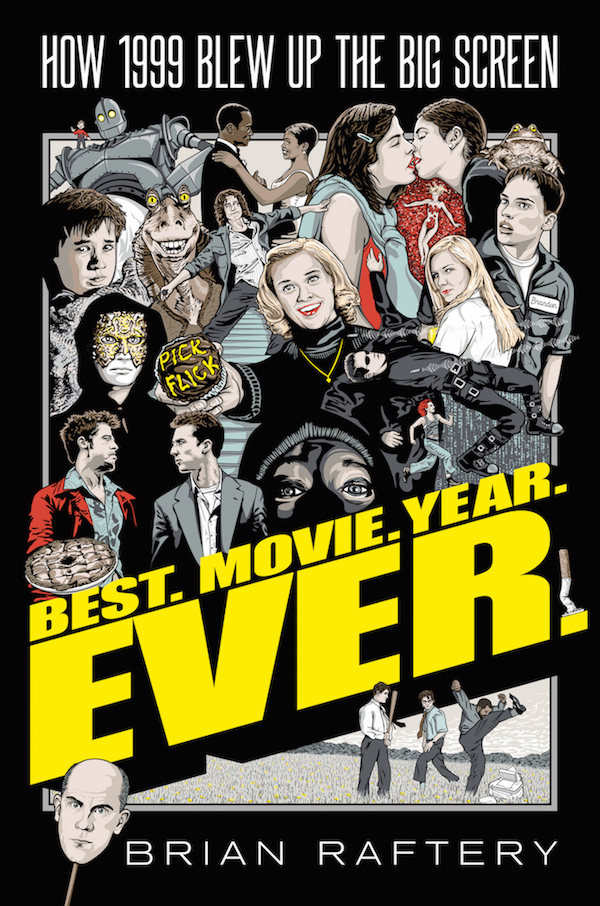In 1999, Reese Witherspoon ran for student body president, Brad Pitt begged us to hit him, Tom Cruise said “fidelio,” three teens investigated the Blair Witch, Heath Ledger danced and pranced and sang “Can't Take My Eyes Off of You,” Keanu Reeves dodged a bullet (or 80), Jason Biggs violated an apple pie and more than one famous actor slid into the enviable mind of John Malkovich through a portal on the seventh-and-a-half floor of a nondescript Manhattan office building, only to be spit out onto a muddy ditch near the New Jersey Turnpike.
And that was just on the silver screen.
Back in the real world, the scenes unfolding were just as indelible: the president had just been impeached, the Columbine shooting rattled the nation, the internet as we know it was taking shape and Y2K—that mythical technological rapture—loomed on the horizon, waiting to hurl society into chaos.
All of this and more are dissected in Best. Movie. Year. Ever.: How 1999 Blew Up the Big Screen. Written by veteran film journalist Brian Raftery, and based on over 100 interviews with industry folk from Christopher Nolan to Kirsten Dunst, the new book is a compendium of 1999’s most important films, as well as a kind of history of America at the turn of the millennium. Not only did the year’s movies reflect the preoccupations of their moment—see: the middle-class resentment in Office Space and Fight Club; the newfangled identity crises of the digital age in The Matrix and Being John Malkovich; the Clinton-era anxieties over the instability of the nuclear family in American Beauty and Eyes Wide Shut—they also foreshadowed shifts in the years to come, both in Hollywood and the country-at-large.
Last week, I caught up with Raftery over the phone to discuss the most overlooked movies of 1999, the best movie year since and which film would’ve won Best Picture, had the Oscars for ’99 been held today...

Where were you in 1999, and what do you remember watching during that time?
I remember watching a lot of these [movies], only because that summer I moved from Central Pennsylvania, where I was at school, to be an intern at Entertainment Weekly in Manhattan.
I remember going to a night screening of The Blair Witch Project at a very tiny screening room in Manhattan, and I really remember, even though I knew it was not real at that point, I remember really griping onto the armrest as I was watching it and walking out into the streets of Midtown at night feeling kind of terrified.
I remember when the Pixies song comes on at the end of Fight Club and feeling kind of pummeled by that. And I remember taking my friend to see Three Kings after I’d seen it the first time saying, “You’ve got to see this movie, it’s amazing.”
I was only eight or so at the time, so it was pretty startling to read about the reactions to Blair Witch in the book. Can you think of another movie since then that has had that sort of in-the-theater effect on audiences?
I remember seeing the first Paranormal Activity and thinking that was pretty fun. I never saw the rest, but in terms of becoming a horror movie that, like, you gotta-see-it-to-believe-it...that was really hard to replicate.
Of all the movies that year, [Blair Witch] feels like the most singular phenom, because I don’t think you could have a Blair Witch today at all. There were people who did not know it was fake, who went in seeing it...but I think part of the fun was kind of telling yourself that you didn’t know. Whereas now [with] the internet, it would just be all day, people being like, “It’s fake, I saw it, it’s fake, it’s all fake.” The kind of mystery that that movie was allowed to accrue over a long buildup, you couldn’t do that [today]. There’s just no way people would want to keep that a secret.
Where do you start with a project like this? Do you start with movies you particularly liked or filmmakers you think were important at the time or...?
I think throughout the course of reporting, I kept swapping out what movies would be in there. But I was looking for movies that were either incredibly important or incredibly popular, but most of the movies, frankly, were both. Movies like Office Space and The Matrix are obviously on different levels of popularity, but you could argue that for someone who’s very young, those movies just exist as classic movies.
Were there any movies you really wanted to include, but couldn’t for one reason or another?
There’s a bunch. I really love Topsy-Turvy, the Mike Leigh movie. I also deeply, deeply love Deep Blue Sea...I love that as a big dumb B-movie. But it was hard to find slots for everything. I would’ve loved to have done more The Straight Story, I would’ve loved to have done more about American Movie—which I think are two great movies from that year.
How different was it rewatching the movies for the book, versus watching them when they came out? Were there any movies on which your opinions changed drastically?
I knew Election was great. I didn’t think that after rewatching it I would basically think it was the best movie of that year. I think things in Fight Club that troubled me back in 1999 trouble me even more, because they feel even more relevant now. I mean I remember being kind of shocked that they blew up the credit card company at the end, but now you look at it, and you’re like, “Well, people literally joke about this everyday on Twitter.” Some of the ideas in that movie are so close to the surface now, in a way that we either didn’t recognize or didn’t want to call out back then. I think that movie has a staying power. It still feels like a gut punch. I also think it’s very funny and very savage and just exceptionally well-made.
The big surprise was seeing how these movies, even if they weren’t trying to predict the future or the 21st century, they wound up calling a lot of things out. I think The Matrix and [Being John] Malkovich both get at what he internet has become in a lot of ways, and the way identities can be hijacked and morphed, and your life can literally be kind of replicated or ripped off online now.
As a culture, we seem pretty preoccupied right now with relitigating movies—and art, in general—from the past. Which movie from 1999 has stood the test of time the best? Which movie has aged the worse? And how much value do you place on relitigating these movies, not only from an aesthetic perspective, but from a political one as well?
I think it’s important, and I like the fact that the lens through which we view film now has changed so much because of the internet.
I think all of these movies can be and should be relitigated. I’m also...not protective, but whenever I look at something that’s older, I try to keep in mind the context of the time in which it was made. Obviously a movie like Boys Don’t Cry is going to be viewed very differently by young people in 2019 than it was in 1999, and I think that movie would not be made the same way now. I think there’d be a trans performer in the lead obviously, and rightfully [Ed. Note: in the film, actress Hilary Swank plays the transgender protagonist]. And I understand that people have problems with that movie. At the same time, seeing that movie a year after Matthew Shepard was on the cover of Time for being murdered, and this violent homophobia in the air in the ‘90s, I think it was a really important movie at the time. I think it still is.
Relitigating versus rewatching...that’s always an interesting question, and I don’t know how to sort of discern between the two of them. I don’t know. I mean it’s tough, it’s really tough, because obviously when you’re looking at any film from 20 years before or anything older, there’s always stuff where you go, “Oh, yeah, that is problematic.” And it’s interesting that when you look at 1999, one year that people bring up as the other best movie year, or one that’s even better, is 1939, and that’s Gone With the Wind, which is kind of like the granddaddy of problematic movies at this point.
As a late twenty-something, there’s a guide aspect to this book. I personally went back and watched some of these movies after reading it. What are some of the most overlooked movies of 1999 that people should go watch?
I think Three Kings is really extraordinary. It’s super funny. Tone-wise, I don’t really know what other movie to compare it to. I love American Movie. I think it’s incredibly kind and funny and also gets at what moviemaking was like in the indie era of the ‘90s. It’s insanely entertaining. I still kick myself for having to cut that stuff from the book. I don’t think enough people have seen Election. I think people sort of GIF that movie or meme it more than they really watch it, but it’s fairly perfect and it feels like it was made today no matter what day you watch it.
Which movies from 1999 would’ve been pitched as TV shows in 2019?
I really think Election could be like an HBO series, like a one-off, or a Hulu show maybe, because the book is really wonderful and there’s a lot more you could do with it. It’s possible The Matrix would be. It would probably be a very different kind of show. It would probably be one of those Netflix sci-fi shows that you’re not really sure people are watching, but that they advertise for a lot. I think Boys Don’t Cry could still be a movie, but it could be possibly some kind of FX series.
Most of these are very hard to imagine as films now, not just for creative reasons, but also from purely financial reasons, they’re a no-win for a studio—to spend 50 to 60 million dollars on something like Fight Club when you don’t know how it’s going to open, whereas now everything is a hedged bet.
I know you mentioned 1939, and I know 1969 is considered one of the biggest years for movies...but in the last two decades, has there been another year that’s struck out to you as being similarly transformational?
I think 2007 is an insane year, because it’s right before the economic crash and you have No Country for Old Men, Michael Clayton and There Will Be Blood, which are very much made in the spirit of these 1999 movies, with very big filmmakers and big studios getting all the resources they need to tell a very personal story that’s also very wide-ranging and appealing.
As you observe in the book, there were some defining aspects of movies in 1999—both thematically, and in terms of their place in the culture-at-large. If you were to look back at this year or 2018, what do you think those defining aspects would be?
I do think sometimes you need five ten years to look because the fact is I don’t think anyone in 2000 was going, “Remember last year when we had all those movies about how our identities were in flux and were thinking about technology?” Like, no one was saying that back then. They were like, “Ocean’s 11’s got a big cast.”
When I think about the movies of last year, I do think that—God, I’m so loathe to even say this—but I do think, if you look at the last two years, certainly the movies are wrestling with and agitated by, I think, the political atmosphere, [and] the concerns about capitalism...I think a lot of movies are very much trying to address a lot of social problems right now without beating you over the head with it. I mean I think Us is kind of a perfect example of a movie that, you can argue whether it makes its point cleanly enough, but the fact is the ideas in that movie about how we treat others around us are pretty relevant to right now and it kind of hangs over you after you watch the movie...it feels like we are trying to figure out through the movies right now sort of who we are maybe as a country and a culture and what atonements, if any, can be made.
There’s been a lot of debate about the Oscars—about how much they’ve changed, but also how much they haven’t. What movie from 1999 do you think would win Best Picture if the Oscars for that year were held in 2019?
It’s so hard to tell what a Best Picture winner is anymore. I think it’s a huge leap in terms of theoreticals, but I actually think that The Matrix would kind of be a perfect Best Picture winner if it came out now. I do think people would want to vote for a big studio movie, I do think they’d want to vote for relatively new filmmakers and I think that movie would be a huge hit, which I think is the kind movie they want to award, even though they haven’t been rewarding big hits lately.
I certainly think the Best Screenplay winners would 100-percent be Being John Malkovich and Election for Original and Adapted. I think everyone realizes those are two phenomenal efforts.
[Ed. Note: At the 72nd Academy Awards, American Beauty won Best Picture, which, given the allegations against Kevin Spacey, definitely wouldn’t have won in 2019; the Best Original Screenplay Oscar went to Alan Ball for American Beauty, while Best Adapted went to John Irving for The Cider House Rules, which pretty much sucks in this editor's humble opinion.]
This article has been lightly edited and condensed for clarity.






